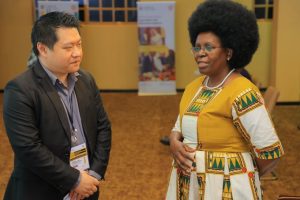Munyonyo – Uganda is moving forward with plans to establish a modern high-tech city as part of its broader vision for innovation-driven economic growth.
The “Eco-Satellite City Project” in Nakigalala, situated between Entebbe and Kampala, is the centrepiece of the initiative, aiming to create a smart, green, and inclusive city to alleviate congestion in the capital and enhance urban living.
Speaking at the Uganda-UAE Business Forum held at Speke Resort in Munyonyo, Dr Monica Musenero Masanza, the Minister of Science, Technology & Innovation (Office of the President), emphasised the country’s commitment to leveraging science, technology, and innovation (STI) as a driver of industrialisation and economic transformation.

“Through science, technology, and innovation, we can transform $5 worth of raw materials into $20 of value,” Musenero said. “This increase benefits both investors and the nation, creating new industries, skills, and opportunities for our people.”
Eco-Satellite City and Vision 2040 ICT City
The Nakigalala Eco-Satellite City is planned as a modern business district featuring premium housing, eco-tourism, and electric public transport. Land ownership challenges have been resolved, enabling the next phase of development in partnership with Malaysia Inc.
The Eco-Satellite City is designed to be modern, green, and inclusive, easing congestion and improving urban living, a critical step in transforming Uganda into a knowledge-based economy.

Additionally, Uganda’s Vision 2040 outlines the creation of a “Hi-tech ICT city” and associated infrastructure, reinforcing the country’s long-term focus on digital transformation and urban innovation.
Science-Led Modernisation: Mission Uganda
Under the leadership of President Yoweri Kaguta Museveni, Uganda has defined “Mission Uganda”, targeting science-led modernisation by 2040. According to Musenero, STI will act as a catalyst across all sectors, including agro-industrialisation, tourism, mineral-based development, pharmaceuticals, mobility, aeronautics, and space.
“Our goal is to create new sectors while also enhancing traditional ones,” she said. “Science, technology, and innovation are not peripheral—they are the vessel for Uganda’s qualitative leap toward a 10-fold growth trajectory by 2040.”

Key high-tech initiatives include: Deep Tech Centre of Excellence — opened in March 2025 to build capacity in AI, machine learning, and quantum computing; Electric Public Transport —pilot projects, including Kiira Motors in Jinja, demonstrating electric buses and fast-charging infrastructure; Day Biopharma Pharmaceutical Campus —Africa’s largest, producing affordable medicines for global markets and Industry 4.0+ and Infrastructure Innovation —eveloping secondary manufacturing, engineering capacity, and smart-city technologies.
Government’s Role in STI
Musenero outlined four critical roles of the state in STI development: Setting a Mission— defining national objectives and aligning the ecosystem for industrial and technological growth; De-risking Investments—educing investor risk in new technologies; Building Capacity—everaging Uganda’s young, educated population and robust infrastructure, including excess electricity and Creating and Expanding Markets—connecting local innovation to national, regional, and continental markets, including the African Continental Free Trade Area.
The government has also implemented structured tools such as public R&D, strategic procurement, policy frameworks, skill alignment, and patient capital to support STI adoption and industrial growth.

Opportunities for Investors
Uganda is actively seeking partnerships and investment in its high-tech initiatives. Pilot manufacturing capacities for electric vehicles, pharmaceuticals, and agro-processing are in place to demonstrate feasibility and attract investment.
“Our environment is naturally favourable for agriculture and manufacturing,” Musenero said. “With technology, we can produce organic, high-value products for global markets. We welcome investors to join us in scaling these initiatives and driving Uganda’s transformation.”

Uganda is positioning itself as a regional hub for technology and innovation. By linking government, academia, and industry under a single coordinated system, the country aims to accelerate its transition from a low-income economy to a competitive, innovation-driven market.
“Uganda is no longer the underdog. With intentional leadership in science, technology, and innovation, we are creating industries, generating wealth, and providing jobs for our youth. Together with our partners, we can harness technology to make Uganda a high-tech hub in Africa,” Musenero concluded.












